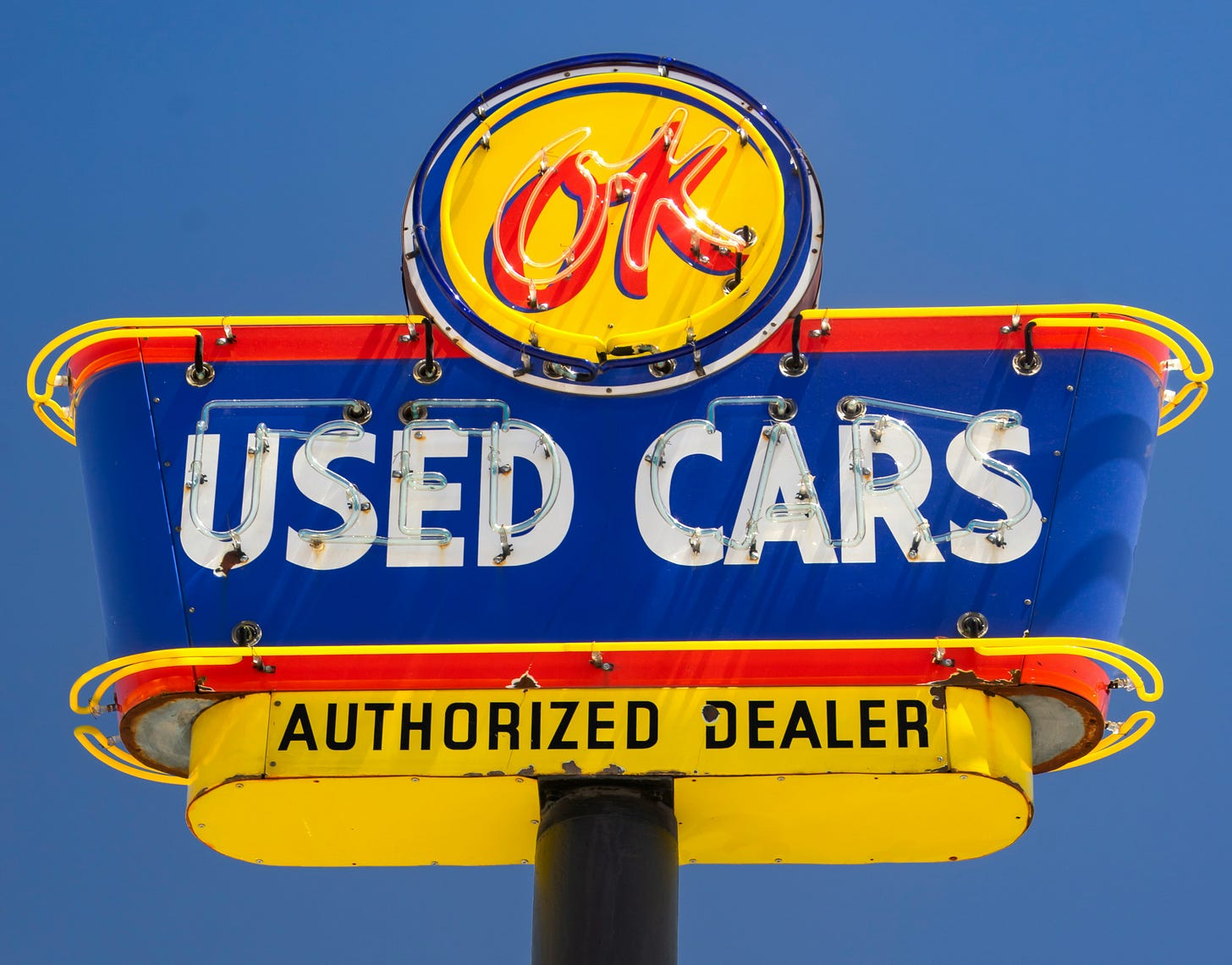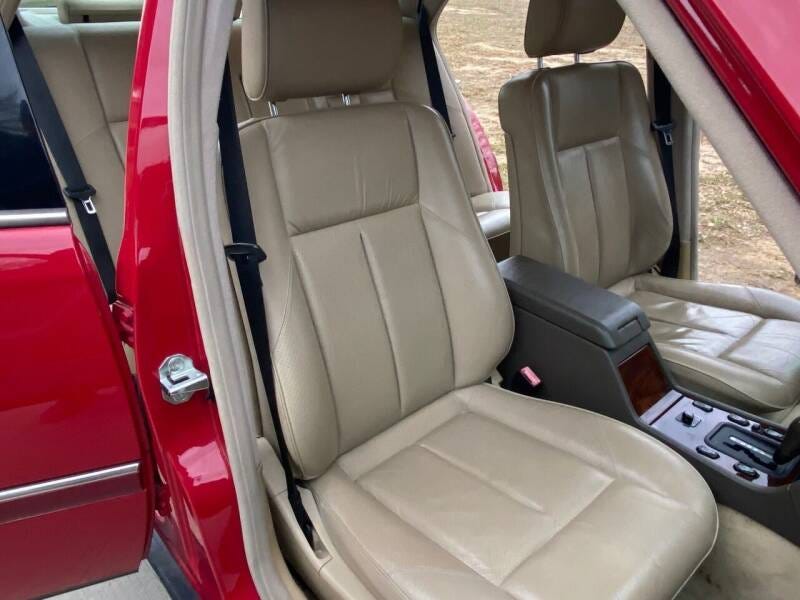The endless freedom of the open road
Soon you’ll be forced to pay handsomely for the privilege of mobility, but it's not too late to enjoy the freedom only an analog car can offer.
John Rubino’s Substack has lots of great info on the changing world in which we live. His ‘Staying Invisible’ series is particularly poignant given today’s surveillance state, and the most recent ‘Part 12,’ about how your car is spying on you, is of significant enough importance that we wanted to riff a bit further on the subject since some team members at Collapse Life have a long standing love affair with the automobile.
In an odd way, modern cars tie into something that our podcast guest last week, Mark Jeftovic, said about the increasing levels of abstraction that we’re seeing and experiencing in the world. So, here goes:
Remember when the pandemic created a massive supply squeeze on computer chips for automakers? At what point did we stand back and ask: why?
Yes, the obvious response is that computers play a vital role in running virtually every process of modern cars. But that’s been an insidious integration not entirely born out of necessity. What has happened over the last 20 years has been a major transformation from cars being a tangible way to get from point A to point B with computers working to improve fuel efficiency and safety, to a platform where you buy the software that controls your entire driving experience and get the mobility thrown in for free.
Mobility is thrown in for free because that’s what a consumer expects when they buy a car. But as Rubino essentially points out, your purchase of a new car today is really just signing an End User License Agreement to have every aspect of your life recorded, analyzed, chopped and diced, and used for ‘insights’ of all sorts, including ‘thought policing’ and law enforcement. Worse though, taking the mobility part of car ownership for granted is a big, big mistake.
The road to a future of limited mobility has been very cleverly plotted. Automakers are now creating subscription services for car features that normally would have been bought outright as part of optioning your car. German automakers BMW and Mercedes-Benz, for example, now offer a horsepower subscription for some of their models — an additional $1,200 per year to “unlock” more power. BMW has a host of other rental/subscription fees for things like remote starting, heated seats, and enhanced parking assistance.
How long before you’re forced to buy the ‘extended travel distance’ subscription to go beyond your city limits for a picnic in the country? Or to do any of the things we currently take for granted, like piling suitcases into the trunk of your car and driving across the country to start a new life? Imagine having to buy a $3,000 option to do that. It’s within the realm of possibilities.
The concept of owning your vehicle is quickly becoming an abstraction. You’ll eventually just buy the rights to access the throttle and brake pedals, but the underlying substance of what makes a car a car will not be owned by you. Or put another way, you’ll only pay for the software license, you won’t own the hardware.
That’s why there’s an ongoing push (and rush) to electric vehicles, while putting a hard deadline on the phase-out of internal combustion engines. EVs have little of the maintenance requirements of traditional cars, making the transition to mobility-as-a-license-agreement happen more quickly and seamlessly for automakers and governments. To take it a step further, if you don’t own the hardware, the power contained within an EV battery isn’t really yours and thus, personal agency around how to use that power no longer exists. If the power stored in your car is needed by your local utility provider to ‘stabilize’ the grid, you’re essentially powerless to change that decision.
Thus, in a world driven by ‘big brother’ data insights and a ‘commodify everything’ mentality, the matrix is metastasizing into an all encompassing control grid. And, as the elites would have it, you’ll have to pay handsomely for the privilege of mobility where, if you can afford it, they get to turn your existence into statistical trends and data analytics that feed a rational, technocratic system. The Sunday drive will be a luxury most cannot afford.
Practically speaking, we can take Rubino’s concept of ‘staying invisible’ a step further with some pragmatic advice when it comes to personal transportation. For starters, do yourself a favor: don’t buy new. Or even late model if you can help it. Sleuth around to find a low mileage (or at least a well maintained high-mileage) analog car that doesn’t have an LCD screen.
Cars from the mid-1990s to mid-2000s are at the bottom of their value curve — high-quality European marques can be had quite cheaply and can provide a thrilling, connected driving experience. Any competent foreign auto specialist can repair them (or better yet, learn to fix them yourself — YouTube and online forums abound!) and parts are still readily and quite cheaply available from places like RockAuto. Yes, this generation of autos still uses electronics to help with say, traction control and fuel economy, but they should be considered ‘pre-enslavement era’ cars, with no internet link, no black box that records every driving input, and options that can’t be turned off remotely.
Craigslist and Facebook Marketplace will be your friends in this search. Craigslist lets you set up ‘alerts’ for new ads of your preferred make and model, so be sure to use them. Autotempest is another great resource to search for listings from across the nation with excellent ways to filter your search.
But, more important than anything else, the best virtue is patience. Buy the car that’s in the right condition, at the right price, on your terms. That can take time, so get your search started ASAP. For a car you’re serious about, a pre-purchase inspection from an independent shop is always a good idea. That way, you’ll have a scorecard on the car’s health, and can negotiate on price if nothing catastrophic is wrong, or simply walk away with very little spent. As a cursory aside, minor mechanical issues are greatly preferred to body work and rust repair.
If you need some inspiration, consider this: one of the team members at Collapse Life just bought this 1996 Mercedes-Benz C220 for the fiat equivalent of an ounce and a half of gold. Yes, the car was high mileage, but Carfax records showed just one owner, dealer serviced from day one, and it just completed a 1,000 mile ‘shakedown’ journey — from Collapse Life headquarters to Alpine, TX and back — flawlessly (and mostly at 80 mph!).
There are many, many analog pre-owned cars out there waiting to be parked in your garage. These are cars that will give you the freedom you seek and best of all, won’t tattle on you when the open road calls, Tom Sawyer is blaring on the stereo, and your right foot is feeling just a little heavier than normal. Enjoy that freedom while you still can.






To take it a step further, if "they" don't like you and your politics they will simply shut your car off. Enjoy the walk.
My preference is to go a different direction and break the dependence on cars altogether. I only drive mine a couple times a month when I have a specific need. Otherwise, I go by bike. I can't say for sure that I would even replace my car if it died. If I *need* a car or truck, I can go over and rent one for like $20/day at U-Haul for local use. Just with the gas, maintenance, and cost of insurance and registration, I would have to do it several times a month to just match the monthly costs of my car, totally ignoring the purchase price. For the odd bits, just call an uber or pay for delivery and you can still come out ahead.
I commuted to work for years by bike. It didn't take much more time than driving my car. It also built my exercise regime into my life instead of having to allocate separate time for it. Inclement weather? Wear a coat. Hot weather? It's not as hot as getting into a car that is 130F or more from sitting out in the sun all day. Flat tire? It is a lot easier and faster to fix a flat on a bike than on a car. Need different clothes for work? They make really nice suit bags that fit on a bike. Change when you get there. Worried about being stinky and sweaty? You are doing it wrong. Start earlier and take it easy.
Even if you are in mind of longer trips, there is a whole ecosystem of bicycle touring. It's not just all the lycra clad crowd. They have really cool ones like going and hitting vineyards and restaurants. People do bikepacking tours and pack along tents and sleeping bags. But even if you don't like roughing it, you can just stop at a hotel for the night. If you live somewhere that has trains, you can do a mixed trip where you mix bicycling and rail travel.
Yes, it takes longer, but it also opens up an entirely different world.